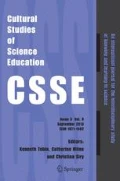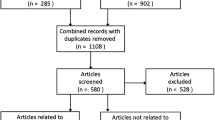Abstract
I respond to Pike and Dunne by exploring the utilization of citizen science in science education. Their results indicate that students fail to pursue science beyond the secondary level, in part, because of prior educational experiences with science education. Students lack motivation to pursue degrees and careers in science because they feel science is not relevant to their lives or they are simply not good at science. With this understanding, the science education community now needs to move beyond a discussion of the problem and move forward with continued discourse on possible solutions. Science educators need to focus on developing connections between students’ everyday lives and science so that they will have tangible reasons for continuing with the lifelong learning of science. In this response, I will show that citizen science as an educational context holds much promise, respectively. Participation in citizen science projects moves scientific content from the abstract to the tangible involving students in hands-on, active learning. In addition, if civic projects are centered within their own communities, then the science becomes relevant to their lives because it is focused on topics in their own backyards.
Similar content being viewed by others
References
Aikenhead, G. S. (2006). Science education for everyday life: Evidence-based practice. New York: Teachers College Press.
Chiappetta, E. L. (2008). Historical development of teaching science as inquiry. In J. Luft, R. L. Bell, & J. Gess-Newsome (Eds.), Science as inquiry in the secondary setting (pp. 21–30). Arlington: National Science Teachers Association Press.
Corburn, J. (2005). Street science: Community knowledge and environmental health justice. Cambridge: MIT Press Books.
Author information
Authors and Affiliations
Corresponding author
Additional information
This review essay addresses issues raised in Angela G. Pike and Mairead Dunne paper entitled: Student reflections on choosing to study post-16.
Rights and permissions
About this article
Cite this article
Jenkins, L.L. Using citizen science beyond teaching science content: a strategy for making science relevant to students’ lives. Cult Stud of Sci Educ 6, 501–508 (2011). https://doi.org/10.1007/s11422-010-9304-4
Received:
Accepted:
Published:
Issue Date:
DOI: https://doi.org/10.1007/s11422-010-9304-4




